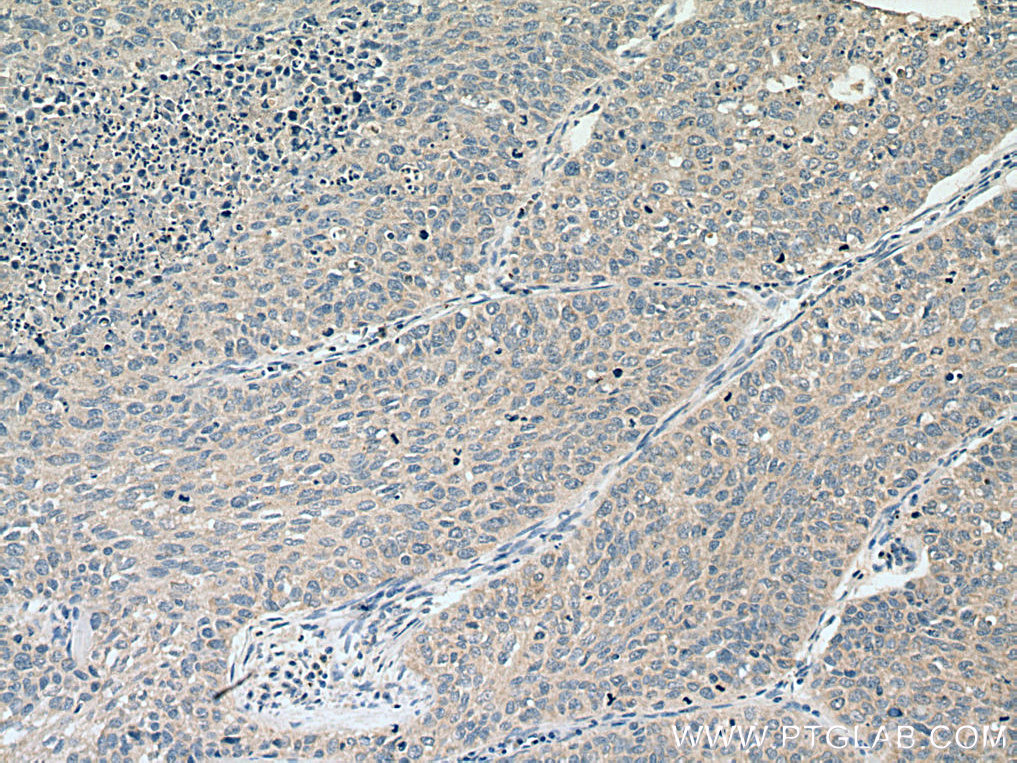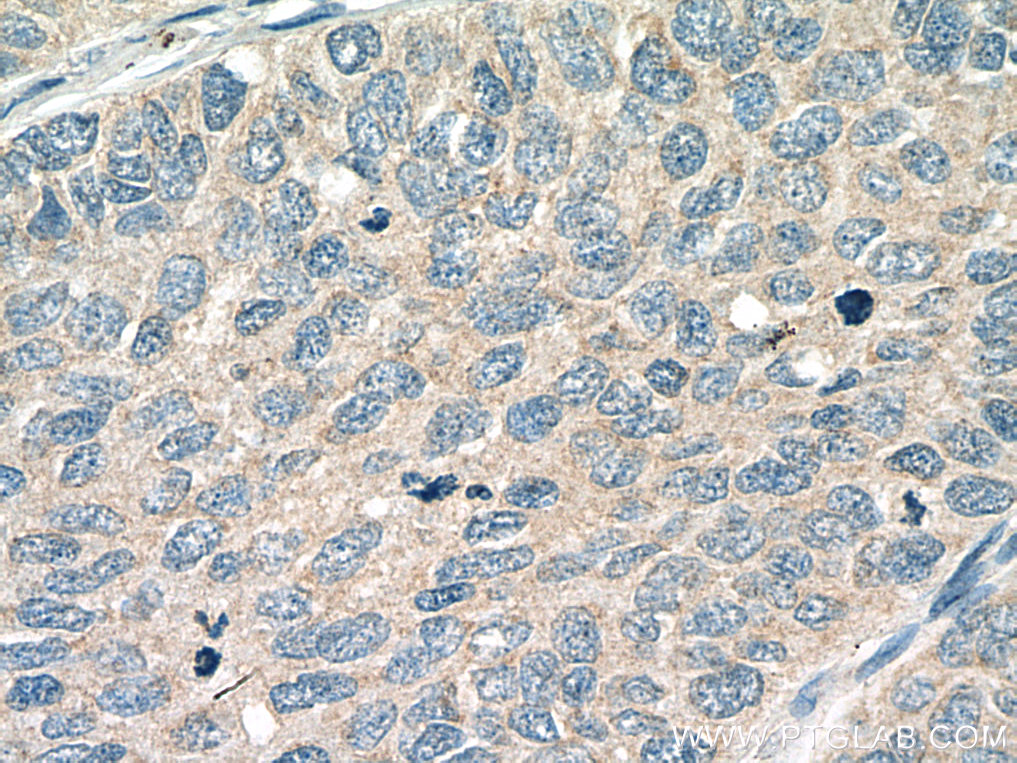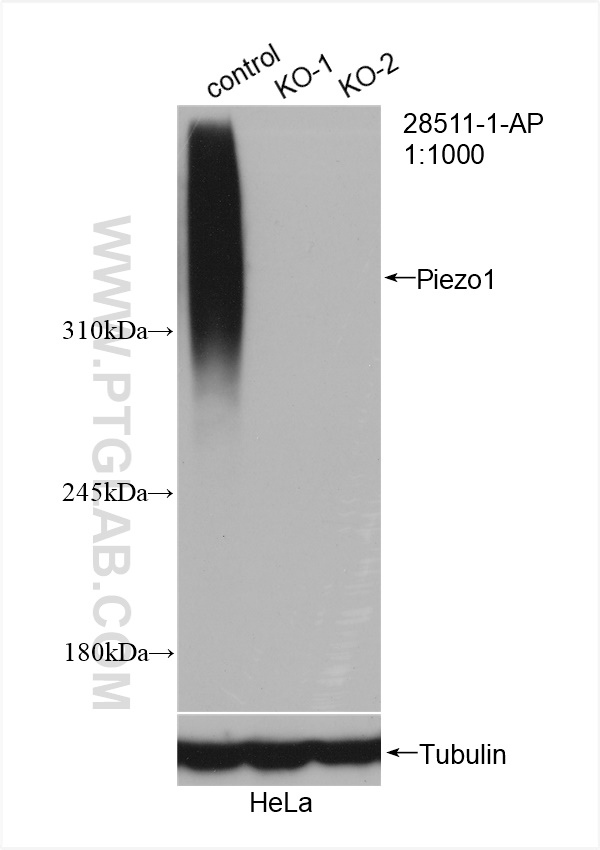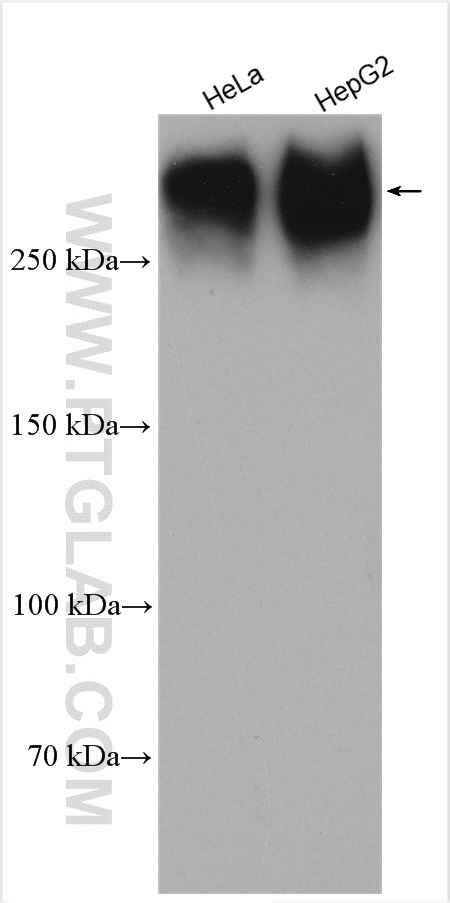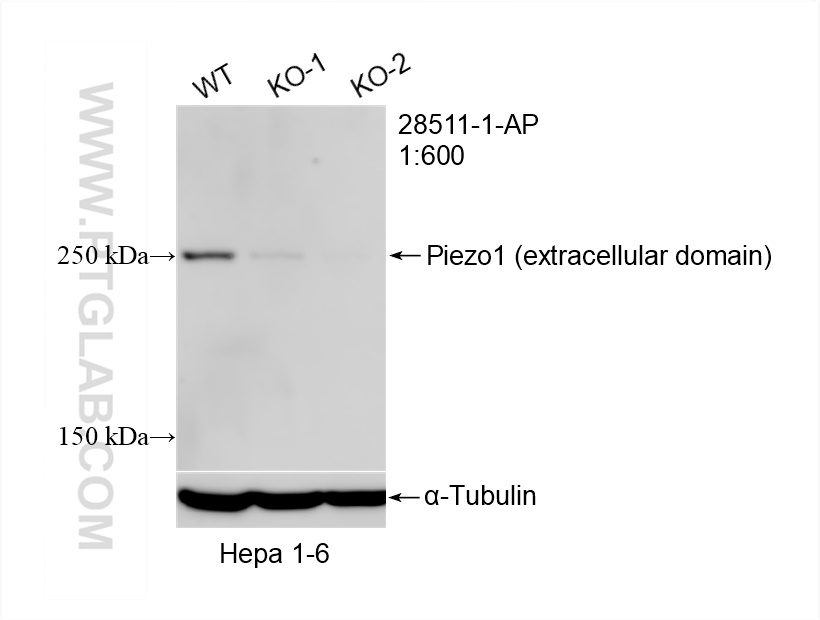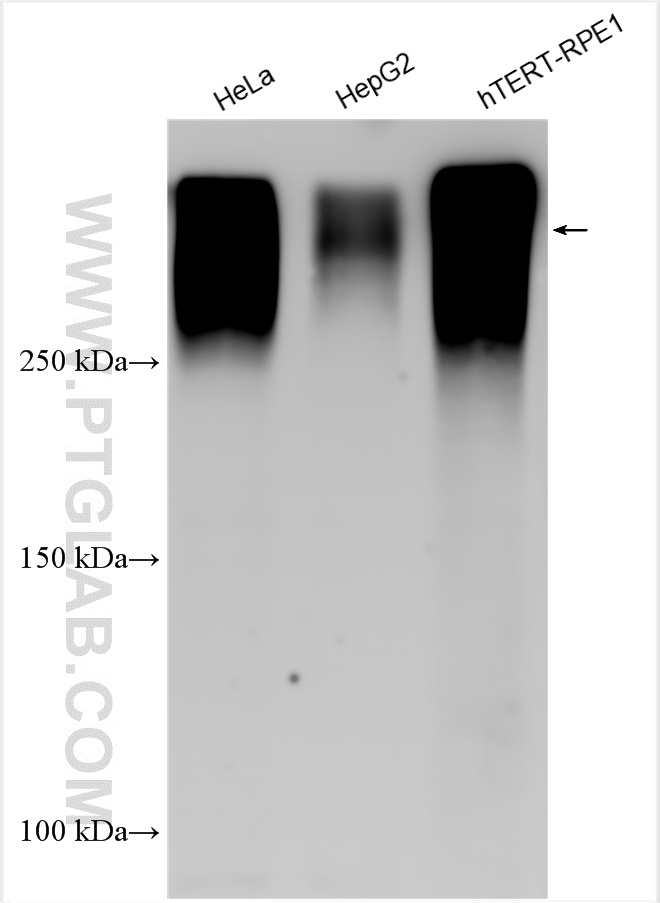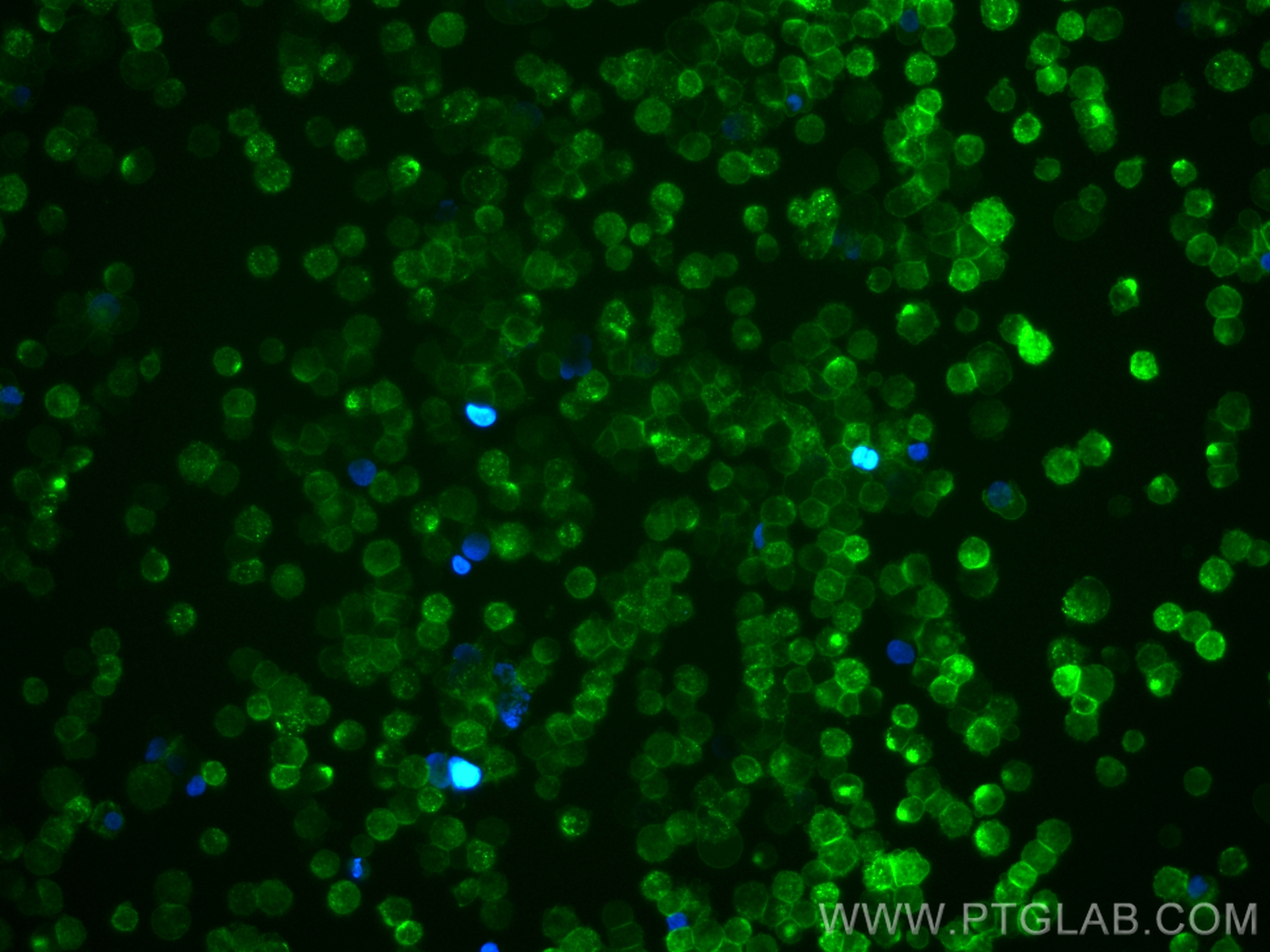验证数据展示
经过测试的应用
| Positive WB detected in | HeLa cells, Hepa1-6 cells, HepG2 cells, hTERT-RPE1 cells |
| Positive IHC detected in | human lung cancer tissue Note: suggested antigen retrieval with TE buffer pH 9.0; (*) Alternatively, antigen retrieval may be performed with citrate buffer pH 6.0 |
| Positive IF/ICC detected in | THP-1 cells |
推荐稀释比
| 应用 | 推荐稀释比 |
|---|---|
| Western Blot (WB) | WB : 1:500-1:2000 |
| Immunohistochemistry (IHC) | IHC : 1:50-1:500 |
| Immunofluorescence (IF)/ICC | IF/ICC : 1:50-1:500 |
| It is recommended that this reagent should be titrated in each testing system to obtain optimal results. | |
| Sample-dependent, Check data in validation data gallery. | |
产品信息
28511-1-AP targets Piezo1 (extracellular domain) in WB, IHC, IF/ICC, IP, CoIP, ELISA applications and shows reactivity with human samples.
| 经测试应用 | WB, IHC, IF/ICC, ELISA Application Description |
| 文献引用应用 | WB, IHC, IF, IP, CoIP |
| 经测试反应性 | human |
| 文献引用反应性 | human, mouse, rat |
| 免疫原 |
CatNo: Ag29858 Product name: Recombinant human FAM38A protein Source: e coli.-derived, PGEX-4T Tag: GST Domain: 108-294 aa of BC008073 Sequence: YEELSRQFDPQPLAMQFISQYSPEDIVTAQIEGSSGALWRISPPSRAQMKRELYNGTADITLRFTWNFQRDLAKGGTVEYANEKHMLALAPNSTARRQLASLLEGTSDQSVVIPNLFPKYIRAPNGPEANPVKQLQPNEEADYLGVRIQLRREQGAGATGFLEWWVIELQECRTDCNLLPMVIFSDK 种属同源性预测 |
| 宿主/亚型 | Rabbit / IgG |
| 抗体类别 | Polyclonal |
| 产品类型 | Antibody |
| 全称 | family with sequence similarity 38, member A |
| 别名 | FAM38A, PIEZO1, KIAA0233, Membrane protein induced by beta-amyloid treatment, Piezo-type mechanosensitive ion channel component 1 |
| 计算分子量 | 286 kDa |
| 观测分子量 | 280-300 kDa |
| GenBank蛋白编号 | BC008073 |
| 基因名称 | Piezo1/FAM38A |
| Gene ID (NCBI) | 9780 |
| RRID | AB_2881161 |
| 偶联类型 | Unconjugated |
| 形式 | Liquid |
| 纯化方式 | Antigen affinity purification |
| UNIPROT ID | Q92508 |
| 储存缓冲液 | PBS with 0.02% sodium azide and 50% glycerol, pH 7.3. |
| 储存条件 | Store at -20°C. Stable for one year after shipment. Aliquoting is unnecessary for -20oC storage. |
背景介绍
Mechanotransduction, the conversion of mechanical force into biological signals, is a fundamental physiologic process of mammalian cells which influences many critical processes including embryonic development, tactile, pain, and auditory sensation, regulation of vascular tone, flow sensing in the kidney, and muscle and tendon stretch. FAM38A, also known as PIEZO1, has recently been identified as a mechanotransduction protein that gets involved in mechanosensation and stretch-activated cation channel activation. Fam38A also plays a key role in epithelial cell adhesion by maintaining integrin activation through R-Ras recruitment to the ER. Mutations in gene encoding PIEZO1 are associated with hereditary xerocytosis. Piezo1 also regulates extrusion to maintain homeostatic epithelial cell numbers. This antibody was raised against the extracellular domain of human Piezo1.
实验方案
| Product Specific Protocols | |
|---|---|
| IF protocol for Piezo1 (extracellular domain) antibody 28511-1-AP | Download protocol |
| IHC protocol for Piezo1 (extracellular domain) antibody 28511-1-AP | Download protocol |
| WB protocol for Piezo1 (extracellular domain) antibody 28511-1-AP | Download protocol |
| Standard Protocols | |
|---|---|
| Click here to view our Standard Protocols |
发表文章
| Species | Application | Title |
|---|---|---|
Glia Mechanosensitive channel Piezo1 is an essential regulator in cell cycle progression of optic nerve head astrocytes
| ||
FASEB J Mechanical stretch activates piezo1 in caveolae of alveolar type I cells to trigger ATP release and paracrine stimulation of surfactant secretion from alveolar type II cells.
| ||
Heliyon The function of Piezo1 in hepatoblastoma metastasis and its potential transduction mechanism
| ||
Mol Neurobiol Exosomal circZNF800 Derived from Glioma Stem-like Cells Regulates Glioblastoma Tumorigenicity via the PIEZO1/Akt Axis
|

